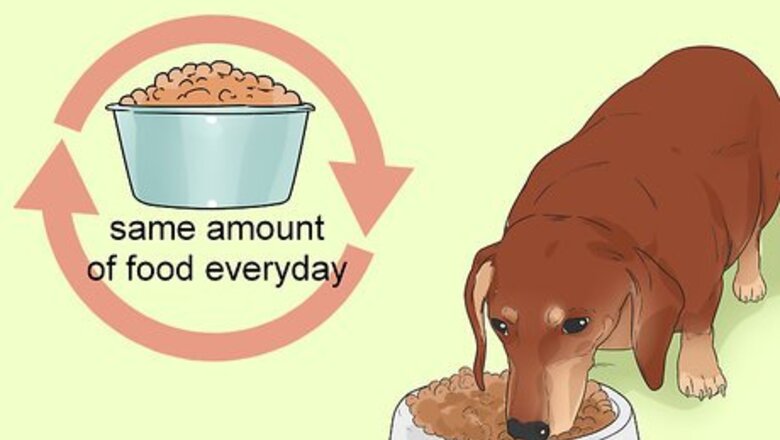
views
X
Research source
If your diabetic dog is also underweight or overweight, however, you may want to look at prescription diets. Regardless of what you feed your diabetic dog, it is important to feed them consistently with the same amount of food served at the same times and without any day to day variations. It is also helpful to keep a watchful eye on their appetite, mood, and everyday habits.
Creating a Consistent Routine
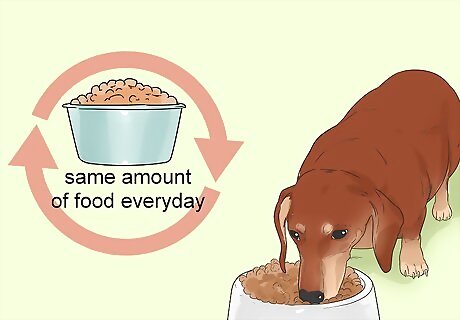
Feed your diabetic dog the same amount of food every day. You want to make sure there are no unnecessary fluctuations in your dog’s insulin requirements. In order to make sure your dog has regular insulin levels, you should feed them the same amount of food every day. The specific amount of food your dog eats every day will be determined by your veterinarian based on your dog’s activity level and current weight. Your veterinarian will give you a specific amount of calories to feed your dog every day and then you can use this number to determine the amount of dog food. The amount of food you feed your diabetic dog will depend on whether you have them on a maintenance diet or have specific weight gain or loss goals for your dog. Regardless, the main thing is to stay consistent in the amount of food you feed your dog. Use an online dog food calculator to determine the appropriate amount of food to feed your dog. You simply enter your dog’s ideal weight and activity level and your dog food’s calories, and the calculator will give you the proper serving size. Try the online calculator on the Dog Food Advisor website: [1] Bring this recommendation to your veterinarian and ask if it is accurate.
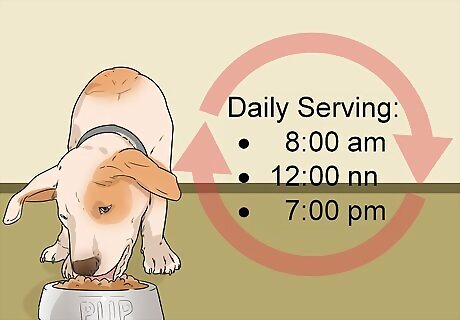
Serve your dog meals at the same times every day. The dog will be processing food and insulin between meals and insulin injections, so you need to get your timing right. You may want to talk to your veterinarian to figure out the appropriate times to feed your dog. Once you have your routine set, you should stick to it every day. If your dog eats two or three times per day, make sure these meals are spread out and given at the same time every day. If you feed your dog when you wake up in the morning, try to keep this routine consistent and serve your dog at the same time every day. If you want to sleep in, try waking up at your regular time (e.g., eight o'clock ) to feed your dog and then going back to sleep. This way your sleeping habits won’t adversely impact your diabetic dog.
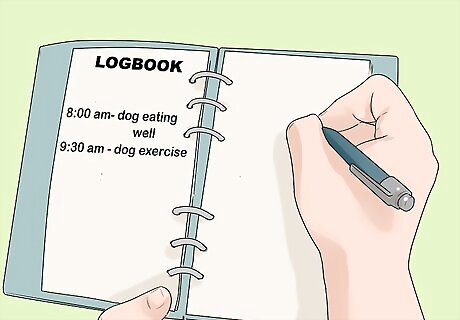
Keep a logbook to track your dog’s diet and health. It is important to keep track of your diabetic dog’s appetite, mood, appearance, weight, water consumption, and urination habits. You can use this logbook to report any changes to your veterinarian. You can also use it to track any possible symptoms of hyperglycemia such as drinking lots of water, frequent urination, loss of appetite, weakness and lethargy. If you see symptoms of hyperglycemia or notice high blood glucose levels, you should contact your veterinarian. You can use the logbook to track hypoglycemia such as confusion, restlessness, weakness, or lack of coordination and shivering. If you see symptoms of hypoglycemia, you should contact your doctor. You can keep track of your diabetic dog’s reaction to any dietary changes or shifts in appetite.
Figuring Out What to Feed Your Diabetic Dog
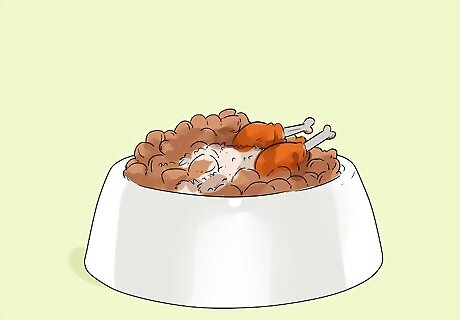
Serve a diet that is high in complex carbohydrates and fiber. A diet that is high in complex carbohydrates and fiber will help ensure a steady release of glucose from the gut. Consider natural dog food. If you can find a natural dog food that is high in carbohydrates, you might consider this option. Natural dog food has the additional benefit of not having chemicals that are difficult for your diabetic dog to process. Diabetic dogs benefit from complex carbohydrates because they digest the food slower and the glucose is absorbed throughout the day. Feed your dog a diet with a low-glycemic index. Low-glycemic foods include fruits, vegetables, and whole wheat products. Simple carbohydrates should be avoided. If your diabetic dog eats a diet with simple carbohydrates or sugars, they will experience rapid spikes in their insulin levels.
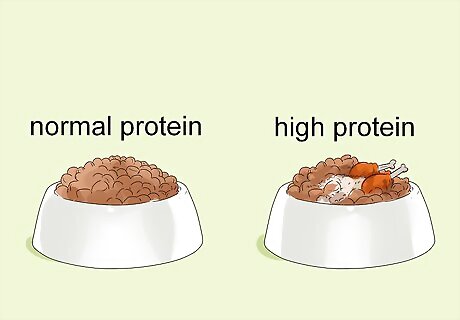
Design a diet that is either normal or high in protein. Many veterinarians recommend a diet that is higher in protein and lower in carbohydrates, although carbohydrates should remain in the diet. Your diabetic dog should be getting at least a regular amount of protein and a higher amount of protein if they are either overweight or experience muscle wasting. If you increase the amount of protein in their diet, you should lower the amount of fat and maintain the same amount of carbohydrates. Forty percent of your dog’s diet should be protein. The rest of the diet should be composed of healthy fats and complex carbohydrates, with thirty percent of the diet allocated to each of these foods. You might try a raw food diet with plenty of protein but make sure your dog isn’t getting too much fat with it.
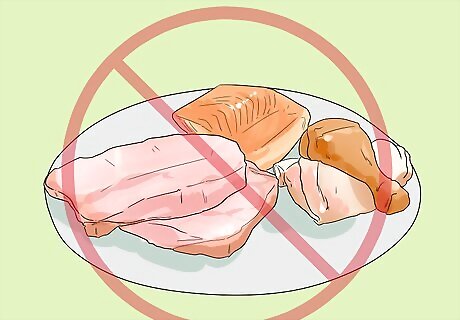
Avoid a high fat diet. You should avoid feeding your diabetic dog a diet that is high in fat. If your dog has high cholesterol, lipemia, or is overweight, you should move to a lower fat diet. Look for dog food that is lower in calories than similar products, which will typically mean it is also lower in fat. Thirty percent of your diabetic dog’s diet should be healthy fats. The rest of their diet should be protein (40%) and complex carbohydrates (30%). Keep in mind that the amount of fat listed on dog food is not always accurate.
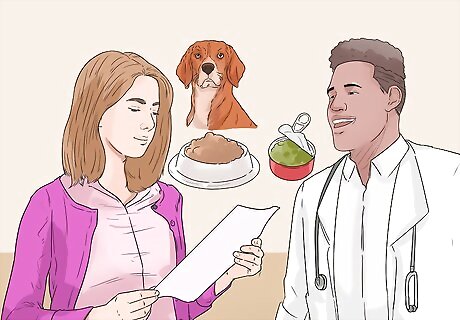
Consider a prescription diet for your diabetic dog. Talk to your veterinarian about possible prescription diets for your diabetic dog. Although a prescription diet is not always necessary for diabetic dogs, your veterinarian should be able to offer advice on whether this is the right choice for you and your pet. Ask your veterinarian: Is there a prescription diet that would be good for my dog? Inquire into the best quality prescription diets: Is there a prescription diet that is higher in quality than other brands?
Feeding Your Diabetic Dog to Maintain Normal Body Weight

Ask your veterinarian when to feed your dog in relation to giving insulin. Your veterinarian may advise you to make sure that your dog has started eating before giving them their insulin. Therefore, you might need to administer your dog's insulin to him while he is eating. Ask your veterinarian for advice that is specific to your dog's situation.
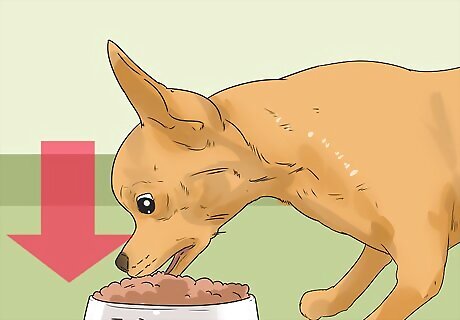
Get your overweight diabetic dog on a diet. Start by talking to your veterinarian about an appropriate diet for your overweight diabetic dog. In consultation with your veterinarian, start feeding your dog on a strict diet. The diet be should be designed to allow your dog to lose weight in a gradual manner and in a way that is safe for their diabetic condition. Ask your veterinarian: What kind of diet would be ideal for my overweight diabetic dog? See if any of your friends have recommendations based on their experiences with overweight diabetic dogs. If any of your dog owning friends have dietary recommendations, look into these diet options in consultation with your veterinarian. The insulin requirement will be lower after weight loss.
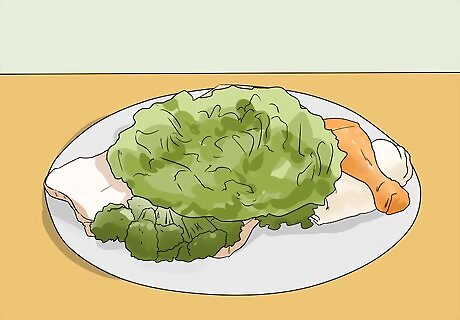
Design a diet for your underweight and diabetic dog. If your diabetic dog is underweight, they should not be on a diet that is high in carbohydrates. You should give them plenty of protein and design a diet with your veterinarian that allows for appropriate weight gain. The first step is to talk to your veterinarian about the most appropriate diet for your underweight and diabetic dog. Ask your veterinarian: Is there a diet that will help my underweight and diabetic dog to gain weight safely?

Ask your veterinarian about a prescription diet. Prescription diets are very good for dogs who are either underweight or overweight. In conversation with your veterinarian, you should be able to find an appropriate prescription diet for your overweight or underweight dog. Inquire about possible prescription diets for your dog: Is there a prescription diet that is appropriate for maintaining proper weight in a diabetic dog? Is there a prescription diet that is perfect for my dog?

















Comments
0 comment